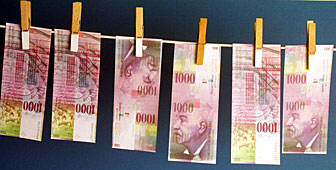Banks face tougher money laundering rules

Politicians, heads of state and other "politically exposed persons" face extra scrutiny from Swiss banks, under tighter money laundering laws.
The Swiss Federal Banking Commission said on Tuesday that the draft laws would place new obligations on banks and securities dealers to monitor and investigate their clients. Greater attention would also be paid to clients involved in “high-risk business relationships”.
The commission said the proposed regulations – which are intended to come into effect by mid-2003 – are aimed at strengthening the “war on money laundering and terrorism”.
The supervisory body added that the decision to make banks more responsible for identifying the owners of accounts had been motivated by money laundering cases involving the late Nigerian dictator, Sani Abacha, and Peru’s former intelligence chief, Vladimiro Montesinos.
Both corruption scandals saw Swiss banks “named and shamed” for agreeing to handle hundreds of millions of dollars secreted away by the two men.
Tighter controls
Under the initiative, banks would be required to develop guidelines to identify so-called “higher-risk business relationships”. These would include knowing where the client lives, their business activities, the size and frequency of transactions, as well as the destinations or origins of regular payments.
“Any bank or securities dealer investigating an unusual transaction that discovers a link to a terrorist organisation, to terrorism or to the financing of terrorism, must report their suspicions immediately,” said the commission in a statement.
“When investigating business relationships presenting higher risks, banks or securities dealers must not be satisfied with information provided by the clients or by their representatives,” it added.
“[They] must check these relationships on the basis of inquiries and publicly available sources.”
No more brown paper bags
For the first time, Swiss banks would also need to attach special emphasis to monitoring so-called “politically exposed persons” such as high-powered politicians who may be in a position to seek bribes or have access to government funds.
“Once they have been identified … senior management must not only take the relevant decisions with regard to these relationships but also monitor them regularly,” said the commission.
In addition, banks would be required to install electronic monitoring systems to keep track of transactions that “stand out due to their size or type”.
The proposed regulations will now undergo a three-month consultation period. Once introduced, they would tighten Swiss banking rules introduced in 1998.
“The proposals meet current international standards and are thus already stricter – in some cases considerably so – than valid rules in other key financial centres,” added the commission.
“However, the banking commission feels that the [current Swiss] money laundering ordinance could be even stricter in some areas.”
by Jacob Greber and agencies

In compliance with the JTI standards
More: SWI swissinfo.ch certified by the Journalism Trust Initiative
You can find an overview of ongoing debates with our journalists here . Please join us!
If you want to start a conversation about a topic raised in this article or want to report factual errors, email us at english@swissinfo.ch.